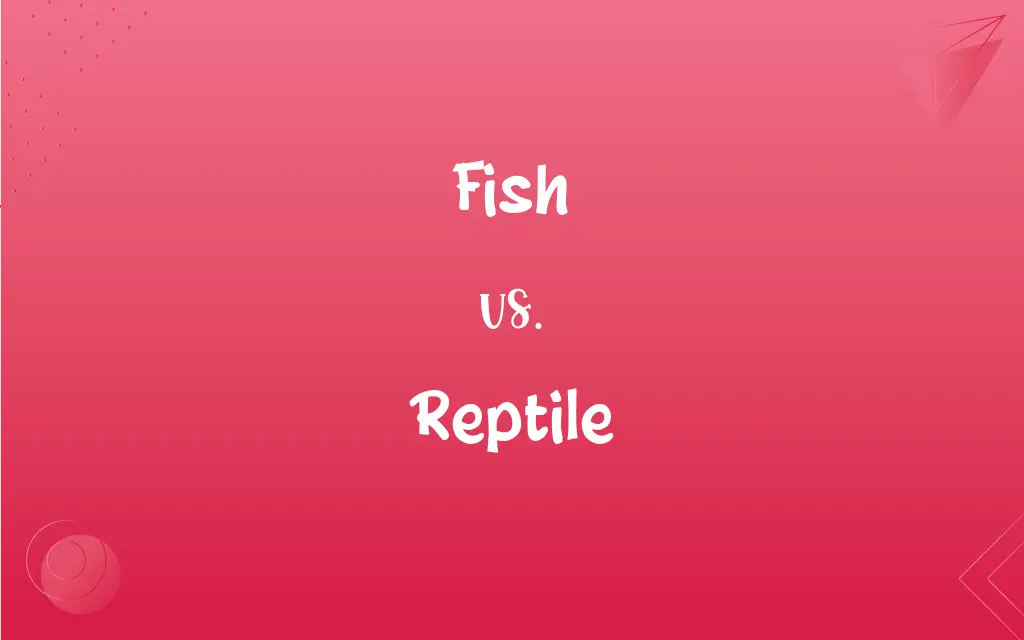Fish vs. Reptile: What's the Difference?
Edited by Harlon Moss || By Janet White || Published on December 2, 2023
Fish are aquatic vertebrates with gills and fins; reptiles are land-dwelling vertebrates with scales, cold-blooded metabolism, and usually lay eggs.

Key Differences
Fish, as aquatic vertebrates, are adapted to life in water, possessing gills for oxygen absorption and fins for movement. Reptiles, in contrast, are primarily land-based vertebrates, characterized by their scaly skin and ability to lay eggs on land. While fish are confined to aquatic environments, reptiles have adapted to a wide range of habitats, from deserts to forests.
The respiratory system of fish is specialized for underwater breathing, with gills extracting oxygen from water. Reptiles breathe air using lungs, a trait that enables them to inhabit terrestrial environments. This fundamental difference in respiratory systems underscores the distinct ecological niches fish and reptiles occupy.
Reproduction in fish can vary from laying eggs to live-bearing, but they typically release their eggs in water. In contrast, most reptiles lay shelled eggs on land, a key adaptation to their terrestrial lifestyle. Some reptiles, however, have evolved to give birth to live young, similar to certain species of fish.
Fish are ectothermic, but unlike reptiles, they don't regulate their body temperature through behavioral means such as basking in the sun. Reptiles, also ectothermic, actively regulate their body temperature by moving between sun and shade. This behavioral thermoregulation is a significant aspect of reptilian life.
The diversity within each group is vast; fish range from tiny guppies to massive sharks, while reptiles include creatures as varied as snakes, turtles, and crocodiles. Both groups play crucial roles in their respective ecosystems, highlighting the diverse strategies of adaptation and survival in the animal kingdom.
ADVERTISEMENT
Comparison Chart
Habitat
Aquatic environments
Mainly terrestrial habitats
Respiratory System
Gills for oxygen extraction in water
Lungs for breathing air
Body Temperature Regulation
Cannot regulate body temperature behaviorally
Often regulate body temperature through sun exposure
Reproductive Method
Primarily lay eggs in water, some are live-bearing
Mostly lay eggs on land, some have live birth
Skin Type
Scales, often slimy
Dry scales, no slime
ADVERTISEMENT
Fish and Reptile Definitions
Fish
A person who is naive or easily duped.
As a newcomer in the city, he felt like a fish out of water.
Reptile
A creature belonging to the class Reptilia, characterized by laying eggs and breathing air.
Crocodiles are large, aquatic reptiles with a powerful bite.
Fish
A card game where players ask for specific cards to form pairs.
The children enjoyed playing Go Fish on rainy afternoons.
Reptile
A cold-blooded vertebrate with scaly skin, such as a snake, lizard, or turtle.
The iguana, a popular pet reptile, requires a warm and humid environment.
Fish
A cold-blooded vertebrate animal that lives in water, breathes with gills.
The salmon, a migratory fish, travels upstream to spawn.
Reptile
An insincere or sneaky person.
He was known as a reptile in the business world for his cunning tactics.
Fish
A piece of technology or equipment, similar in shape to a fish.
The submarine used a fish-shaped drone for underwater exploration.
Reptile
A type of leather made from the skin of a reptile, used in fashion.
Her handbag was made of expensive reptile leather, a luxury item.
Fish
A creature hunted for sport or food, living in rivers, lakes, or seas.
He spent the weekend fishing for trout in the mountain lake.
Reptile
A symbol in various cultures, often representing renewal or danger.
In ancient mythology, the serpent was a revered reptile symbolizing wisdom.
Fish
Any of numerous cold-blooded aquatic vertebrates characteristically having fins, gills, and a streamlined body and including the bony fishes, such as catfishes and tunas, and the cartilaginous fishes, such as sharks and rays.
Reptile
Any of various usually cold-blooded egg-laying vertebrates often grouped in the class Reptilia, having dry skin covered with scales or horny plates and breathing by means of lungs, and including the snakes, lizards, crocodilians, and turtles. In some classification systems, birds are considered to be reptiles because they are descended from reptilian dinosaurs.
Reptile
A person regarded as contemptible or obsequious.
FAQs
What defines a fish?
A fish is an aquatic vertebrate with gills and fins, living in water.
What is the largest known fish?
The whale shark is the largest known fish species.
Can reptiles be found in deserts?
Yes, many reptiles, like certain lizards and snakes, thrive in desert environments.
Can fish live outside water?
No, fish need water to breathe and survive.
What are the main characteristics of reptiles?
Reptiles are characterized by their scaly skin, egg-laying on land, and cold-blooded metabolism.
Are all reptiles scaly?
Yes, one defining feature of reptiles is their scaly skin.
Are reptiles warm-blooded?
No, reptiles are cold-blooded and rely on external heat sources.
What is a common habitat for fish?
Fish commonly live in oceans, rivers, and lakes.
Do all reptiles lay eggs?
Most reptiles lay eggs, but some, like certain snakes, give birth to live young.
Do reptiles show parental care?
Most reptiles do not show extensive parental care, though there are exceptions.
Can reptiles be domesticated?
Some reptiles can be kept as pets, but they are not domesticated like dogs or cats.
How do reptiles regulate their body temperature?
Reptiles regulate their temperature behaviorally, like basking in the sun.
Are fish social animals?
Some fish are solitary, while others, like schooling fish, are highly social.
Are reptiles found in cold climates?
Some reptiles, like certain lizards and snakes, can live in cooler climates, but they are less active in cold temperatures.
Do fish have lungs?
No, fish breathe through gills, not lungs.
What is the lifespan of a typical reptile?
Reptile lifespans vary greatly, from a few years to over a century in some turtles.
How do fish communicate?
Fish communicate through a variety of means, including sounds, movements, and chemical signals.
What role do fish play in ecosystems?
Fish are crucial in aquatic ecosystems, serving as both predators and prey.
Can fish feel pain?
Research suggests that fish can feel pain, though differently from mammals.
What is the diet of most fish?
Fish diets vary widely, from plankton to other fish or aquatic organisms.
About Author
Written by
Janet WhiteJanet White has been an esteemed writer and blogger for Difference Wiki. Holding a Master's degree in Science and Medical Journalism from the prestigious Boston University, she has consistently demonstrated her expertise and passion for her field. When she's not immersed in her work, Janet relishes her time exercising, delving into a good book, and cherishing moments with friends and family.
Edited by
Harlon MossHarlon is a seasoned quality moderator and accomplished content writer for Difference Wiki. An alumnus of the prestigious University of California, he earned his degree in Computer Science. Leveraging his academic background, Harlon brings a meticulous and informed perspective to his work, ensuring content accuracy and excellence.






































































